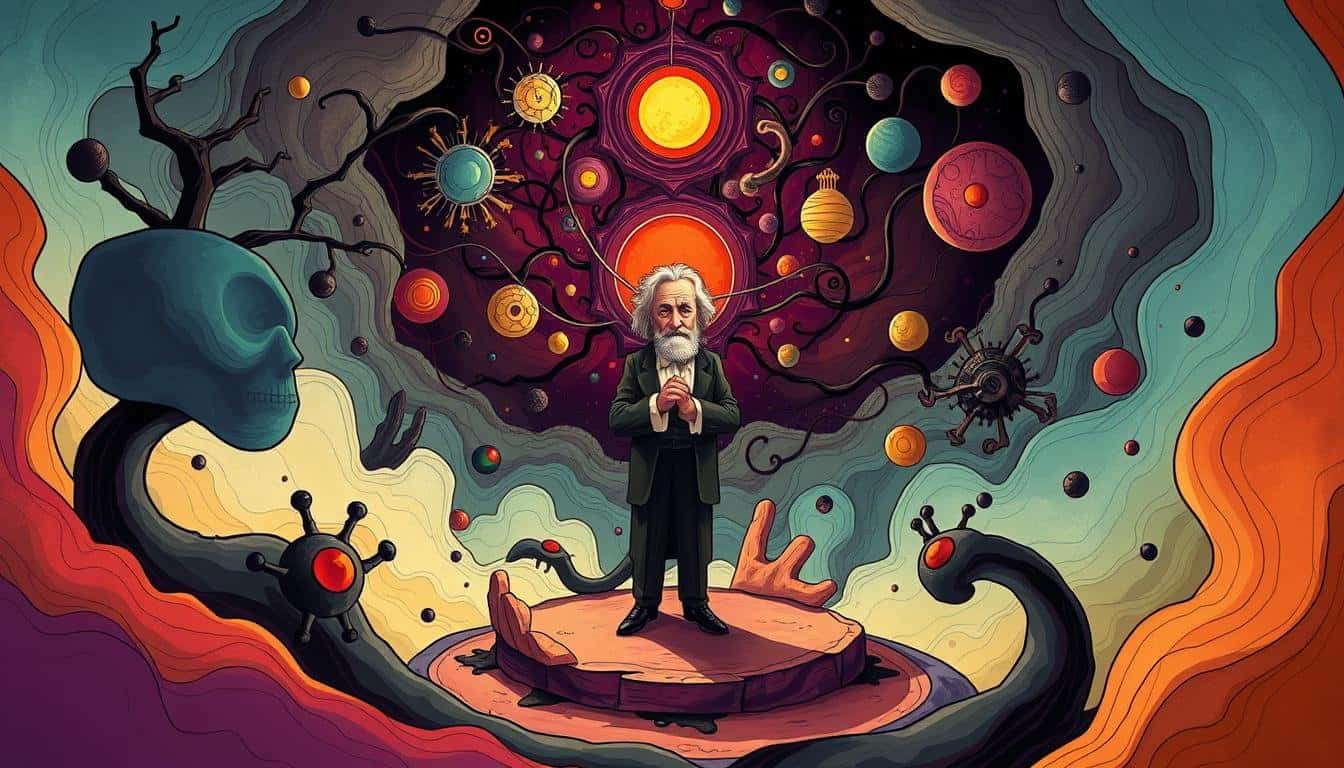The Influence of Hegel on Modern Philosophy
Imagine if the way we see reality, society, and ethics was shaped by an 18th-century philosopher. This idea makes us think about G.W.F. Hegel’s impact. Born in 1770 in Stuttgart, Hegel’s work changed philosophy. His ideas on consciousness, freedom, and dialectics influenced many fields, from social theory to political philosophy.
As we look into Hegel’s philosophy, we see how his ideas still shape our views today. His work, like the “Phenomenology of Spirit,” is still important. It shows how his thoughts on consciousness and freedom changed the way we think.
Key Takeaways
- Hegel’s system represents a culmination of critical philosophy that shaped modern thought.
- His works, particularly the “Phenomenology of Spirit,” remain pivotal in understanding consciousness and freedom.
- Hegel’s relationship with predecessors like Kant laid crucial groundwork for German idealism.
- The revival of interest in Hegel in the late 19th century marked a significant shift in Anglo-American philosophy.
- Hegelian ideas have influenced various movements, including existentialism and Marxism, demonstrating their enduring impact.
Introduction to Hegelian Philosophy
Hegelian philosophy is a deep and detailed way to understand human thought and society. Georg Wilhelm Friedrich Hegel (1770–1831) created this framework. It focuses on freedom and how society and politics work. An overview of Hegel’s ideas shows how he mixed different philosophical views into one big picture of human growth.
Hegel’s key work, the Elements of the Philosophy of Right, came out in 1821. It covers important topics like property, punishment, and morality. It also talks about family, society, law, the state, and war. This book is a key way to see why significance of Hegel in philosophy matters, especially his way of looking at opposites as part of a bigger picture.
Many famous thinkers, like Karl Marx and Charles Taylor, were influenced by Hegel. This shows how his ideas still shape today’s thought. There are ongoing debates about his views on progress and staying the same. These debates show how Hegel’s ideas are still important.
Understanding Hegel means diving into his complex texts, like the Phenomenology of Spirit. This book needs several reads to fully grasp. Scholars are still figuring out how to fit his political ideas into his overall philosophy. Hegel’s idea of freedom is unique, focusing on the growth of consciousness. This idea has greatly influenced modern philosophy.
Context: German Idealism and Hegel’s Place
German idealism started in the 1780s and lasted until the 1840s. It aimed to answer big questions and link logic, metaphysics, and ethics. Hegel is a key figure in this movement, especially when talking about his work with Kant and Fichte.
Hegel’s Relationship with Kant and Fichte
Hegel’s work was deeply influenced by Kant and Fichte. Kant’s ideas on transcendental idealism were a starting point for Hegel. He built on these ideas, especially Fichte’s focus on self-awareness. This way, Hegel made a big leap in German idealism, showing how important thought is in understanding the world.
Influence of Romanticism on Hegel
Romanticism had a big impact on Hegel’s ideas. It brought in themes like individualism and cultural expression. Hegel mixed these with his idealism to create a deeper understanding of growth and change. This mix made his philosophy stand out in German idealism.
Key Works of Hegel and Their Significance
Georg Wilhelm Friedrich Hegel’s works changed modern thought. His key texts show how philosophy, ethics, and logic have evolved. They greatly changed how we talk about these subjects in schools and universities.
His works have different themes. They reflect his three main ideas: consciousness, the growth of ideas, and how the state and individual freedom interact.
The Phenomenology of Spirit
The Phenomenology of Spirit, from 1807, looks at how we become aware of ourselves. Hegel describes a journey of consciousness that ends in full understanding. This book has deeply influenced thinkers since then, helping us grasp human life and history.
The Science of Logic
The Science of Logic, in two volumes, goes deeper into Hegel’s way of thinking. It talks about how ideas grow and change, leading to new insights. This book challenges old ideas about logic and reality, showing how concepts change and grow.
The Philosophy of Right
The Philosophy of Right, from 1821, shares Hegel’s thoughts on ethics, laws, and the state. He believes true freedom comes from being part of a community, not just being alone. This idea has shaped modern political thought a lot.
| Key Work | Publication Year | Significance |
|---|---|---|
| The Phenomenology of Spirit | 1807 | Explores the development of consciousness and self-awareness |
| The Science of Logic | 1812-1813 | Discusses logical processes and dialectical evolution |
| The Philosophy of Right | 1821 | Examines ethics, law, and the role of the state in freedom |
The Influence of Hegel on Modern Philosophy
Hegel’s ideas have deeply influenced modern philosophy. His way of thinking and the idea of history as a logical process have touched many thinkers since the 19th and 20th centuries. From 1860 to 1915, American schools taught neo-Kantian ideas, which sometimes made Hegel’s work less known.
The debate between Kant and Hegel changed modern philosophy. Even though Hegel was less popular in England and America, his ideas stayed strong in German universities and later in France and Italy. In the mid-20th century, people started to look at Hegel’s early writings and the Phänomenologie again, thanks to existentialist ideas.
Hegel’s impact on modern thought is huge, especially in existentialism, Marxism, and postmodern philosophy. His ideas about consciousness, society, and politics are widely recognized. This is despite some philosophers preferring a focus on problems rather than big ideas.
When it was Hegel’s 200th birthday in 1970, his ideas became popular again. Scholars like Hermann Glockner and Nicolai Hartmann made big contributions. Today, people still talk a lot about how Hegel’s ideas affect our views on ethics and politics.
| Era | Major Influencers | Key Themes |
|---|---|---|
| 19th Century | Kant, Hegel | Dialectics, Individualism |
| Mid-20th Century | Existentialists | Consciousness, Alienation |
| Bicentennial (1970) | Glockner, Hartmann | Neuhegelianismus, Ethical Life |
Hegel’s Impact on Contemporary Thought
Hegel’s ideas still shape many areas, like sociopolitical theory and ethics. His work is not just old news; it’s still key in today’s debates. He linked individual rights with the duties of society.
Relevance in Sociopolitical Theory
Hegel’s ideas about community and state are still vital in discussions on governance and human rights. He saw a deep link between freedom and the state. This view helps scholars think about how his ideas guide policy and civic actions today.
Influence on Modern Ethical Frameworks
Many modern ethicists look to Hegel when thinking about how individual rights fit with societal norms. He believed community is key to personal happiness. His thoughts help tackle today’s moral challenges, linking past and present ethics.
Hegel’s Relevance in Today’s Philosophy
Hegel’s ideas still stir up deep discussions among scholars today. His thoughts on identity, consciousness, and history make us think differently. They show how complex our beliefs and actions are.
His method, the dialectical approach, helps us see how our personal choices connect to our ethics and society. It’s like a puzzle where every piece fits together to form a complete picture.
Hegel believed in Sittlichkeit, which means living in harmony with society. This idea is still important today as we try to find our place in the world. He showed us how important it is to feel connected to others and to have shared values.
His ideas blend Enlightenment values of reason with Romantic feelings of emotion. This mix reflects our need for both logic and passion in life. It’s about finding a balance between thinking things through and feeling deeply.
Hegel saw history as a journey towards unity. His view helps us understand today’s complex issues better. Even critics like Schopenhauer and Marx built on his ideas, showing his wide influence.
In our times of questioning identity and ethics, Hegel’s work is more relevant than ever. His philosophy helps us grasp the deeper aspects of being human.
Reception of Hegel’s Ideas: From Acceptance to Critique
Hegel’s ideas have gotten a wide range of reactions, from strong support to sharp criticism. This part looks at how people have seen Hegel’s work. It focuses on the early reactions and how existentialism took shape. It also looks at the critiques from analytic philosophy.
Early Reception and Existentialism
Right after Hegel published his work, many thinkers started to really get into his ideas. Existentialists like Kierkegaard saw a lot to like in Hegel’s focus on the individual. They used Hegel’s ideas to explore what it means to be free and responsible. But they didn’t stay with Hegel. They went off to create their own unique views on life and existence.
Hegel’s Critique by Analytic Philosophy
Then, analytic philosophy came along and really questioned Hegel’s ideas. People like Bertrand Russell thought Hegel’s views were too complex and not logical. This critique by analytic philosophy challenged Hegel’s way of thinking. It also changed how people saw his ideas in the world of philosophy.
| Philosophical Movement | Response to Hegel |
|---|---|
| Existentialism | Initial acceptance; later divergence focusing on individuality. |
| Analytic Philosophy | Critique of metaphysical complexity and rationality. |
| Marxism | Adapting Hegelian dialectics to material conditions. |
| German Idealism | Continuation of Hegelian thought through scholars. |
| Postmodernism | Influence on critiques of foundationalist beliefs. |
Marxism: Adapting Hegelian Thought
Marxism builds on Hegelian thought to deeply understand economic and social theories. Marx used Hegel’s ideas to criticize capitalism, creating a new view of society and class struggles. This change led to a fresh look at how societies evolve.
Marx’s Dialectical Materialism
At the heart of Marx’s ideas is dialectical materialism, a departure from Hegel’s idealism. He focused on the real world, linking economics to social structures. Marx’s views on value came from thinkers like Adam Smith and David Ricardo, and also from utopian socialists.
The Influence of Hegelian Dialectics on Political Economy
Marx’s work in political economy comes from adapting Hegel’s dialectics. He moved from ideas to real-world issues. This change emphasized the importance of class struggles and historical change.
Events like the Industrial Revolution and the Revolutions of 1848 influenced Marx. They helped merge his theories with reality. Understanding Hegel’s ideas helps us see how Marx’s thoughts evolved, showing the complex nature of political economy.
Contemporary Philosophical Trends Influenced by Hegel
Today’s philosophical trends have roots in Hegel’s deep ideas. Existentialism and postmodern critiques show how his thoughts are still used. They offer different views and uses of Hegel’s philosophy.
Existentialism and the Philosophy of Consciousness
Existentialism builds on Hegel’s ideas about consciousness and self. It looks at how we exist, our freedom, and being true to ourselves. Thinkers like Jean-Paul Sartre and Simone de Beauvoir use Hegel to highlight the power of personal choices and experiences.
They show how we can find our own meaning in a world that doesn’t care. This shows how Hegel’s ideas are still important in talking about what it means to be human.
Postmodern Critiques and Hegel
Postmodern thinkers question Hegel’s big views on history and meaning. Michel Foucault and Jacques Derrida use Hegel to challenge traditional ideas. They point out that knowledge is broken into many pieces and there are many ways to see things.
This debate shows how thinkers today use Hegel’s ideas to look at our society and culture. It’s a way to understand and question our world.
| Philosophical Trend | Key Themes | Influential Thinkers |
|---|---|---|
| Existentialism | Individual existence, freedom, authenticity | Jean-Paul Sartre, Simone de Beauvoir |
| Postmodernism | Fragmentation of knowledge, plurality of perspectives | Michel Foucault, Jacques Derrida |
| Scientific Philosophy | Role of science in philosophical discourse | Alexander Bird, Alan Richardson |
These trends show how Hegel’s ideas are still shaping today’s thought. They add depth and complexity to our discussions about philosophy.
Hegel’s Lasting Legacy in Contemporary Thought
Hegel’s ideas still shape today’s thinking. Scholars delve into his complex theories, showing their impact on modern thought. They explore how his ideas mix with the growth of political philosophy.
Ongoing Hegelian Scholarship
Research on Hegel shows his wide influence across fields. Richard Bourke, for example, rethinks Hegel’s views, showing he was more about freedom and democracy than totalitarianism. This work uncovers new meanings in Hegel’s texts, especially on freedom and progress.
Impact on Modern Political Philosophy
Hegel’s ideas deeply affect today’s political debates. His saying “what is rational is actual; and what is actual is rational” sparks discussions on governance and the state. Critics see his focus on history, while supporters see his method as a way to understand and navigate today’s challenges.
His thoughts on freedom and individual happiness make us think about our role in democracy. This shows how Hegel’s ideas are still vital in today’s political discussions.
Conclusion
We’ve looked into how Hegel’s ideas have shaped modern philosophy. His thoughts on dialectics, freedom, and history are still important today. They influence discussions in the philosophical world.
His ideas are seen in Marxist economics and the study of free-market capitalism and liberal democracy. Works by Francis Fukuyama show this interest too.
Hegel’s philosophy helps us think about today’s problems. He believed recognition is key to freedom. His views on liberal economics also show the need for a balance between markets and rules.
This balance is important for true freedom in society. Hegel’s ideas are still growing and changing. They help us understand our world, especially with new technology and social changes.
So, Hegel’s thoughts are still vital for philosophy today. They give us a strong base for thinking about our world.
Source Links
- Georg Wilhelm Friedrich Hegel
- How the Anglophone world is rediscovering Hegel’s philosophy | Aeon Essays
- Hegel’s Social and Political Philosophy
- G.W.F. Hegel: An Introduction | Issue 140
- German Idealism | Internet Encyclopedia of Philosophy
- German Idealism and Modernism – 3:16
- Hegel: Social and Political Thought
- Georg Wilhelm Friedrich Hegel
- Georg Wilhelm Friedrich Hegel | Biography, Books, & Facts
- Georg Wilhelm Friedrich Hegel – German Philosopher, Idealism, Dialectic
- Hegelianism – Routledge Encyclopedia of Philosophy
- Hegel on Philosophy in History
- Hegel and History | Oxford Political Review | Oxford Political Review
- Impact (Chapter 7) – Hegel’s Phenomenology of Spirit
- Why is Hegel’s Philosophy Relevant Today? Hegel and Modern Society: Part 2
- Why is Hegel’s Philosophy Relevant Today? Hegel and Modern Society: Part 1
- Explore Hegel’s Dialectic & Its Impact on Modern Philosophy
- Hegelianism – Routledge Encyclopedia of Philosophy
- The Logical Influence of Hegel on Marx by Rebecca Cooper 1925
- Hegel and Marx (Chapter 12) – Hegel and the Foundations of Literary Theory
- Marx and Alienation: Essays on Hegelian Themes
- Continental Philosophy from Hegel
- Hegel’s Aesthetics
- Hegel Is Still an Important Thinker for the Left
- Hegel on History | Issue 129
- Hegel and the unfolding idea of freedom in the 21st century
- Hegel for Us Moderns – Max Skjönsberg
- The difficulty with Hegel | The New Criterion







